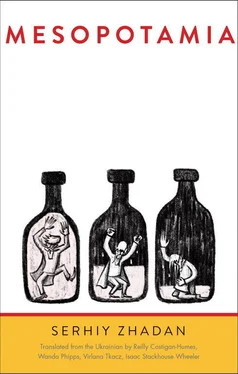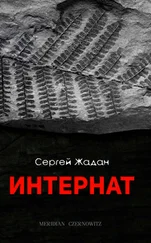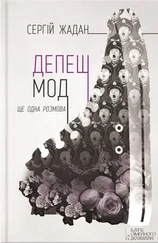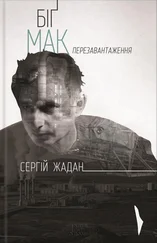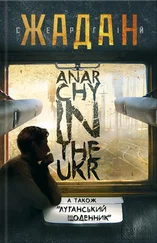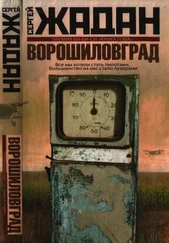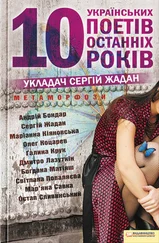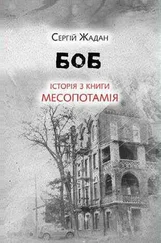That is why everything will end by starting again at the beginning,
falling into the throat and lying on the retina,
filling us with love and oblivion,
instantaneously
at conception.
□ □ □
You touch the atmosphere and disturb the equilibrium.
Everything we’ve lost, everything we’ve found,
all the air that passed through our windpipes—
what sense does it all make without our pain and disappointments?
What value does it have without our joy?
After all, it’s all about your fingers.
You touch her clothes and know nothing
can be taken back, a name spoken once
changes the voice, coils around the roots of words,
so you struggle from now on with dead languages,
as you attempt to use them
to communicate with the living.
You touch her things and understand: behind each word,
behind each deed stands the impossibility of return.
Courage and sorrow push us forward—
love is irreversible, and we can’t decipher most
dark prophesies and visions.
What happens to us is only what we wanted,
or only what we feared. The question is
what will win—desire or fear.
The night will ring with music in the web
of our fingers, the room will fill with light
from the dictionaries we’ve brought.
After all, everything depends on our ability
to speak the dead language of tenderness.
Light is shaped by darkness,
and it’s all up to us.
□ □ □
Because we have to make this road ourselves
to the very end, because this road is not the last one,
we celebrate work, which has divided us into social strata and classes,
we sing of the dead, and the silence they left behind.
We build this road between far-flung cities,
we lay it down in the heat of summer and in winter flurries,
confidently calling out to each other in the fog,
never scrimping on our hate or our cigarettes.
Because every road is our joy and weariness,
because every stop is our silence and solitude,
because we always know who waits for us at home,
we understand dedication and we know there’s no going back.
Each of us will have lots to tell after death,
although we don’t believe it will ever come.
Heaven warms us up in worn-out jackets.
I have a heart, and I understand what it’s worth.
I have a voice, and that’s why I can communicate,
this road can truly be easy,
because a warm moon hangs overhead
and you can always reach up to touch it.
That’s why we build this road from silence and clay,
We stretch it out like a thread behind us,
between sound and silence, between heaven and earth,
between light and darkness, between love and oblivion.
□ □ □
Five years standing watch, five years as a worker,
dark sunburnt skin, hot veins.
When I return I will talk till
the last gaping fool walks away.
I will tell him about the cities, countries,
about the seasonal hired hands who
raised walls and towers all these years,
raised them like warriors after convalescence.
I will tell him how sirens called us to work,
how we slept in churches under the trumpets of the archangels,
and on the rooftop, crosses were as sensitive as antennas,
so you could listen in on the conversations of the saints.
It made no difference where each of us came from.
The differences were in the heavens above.
In the East we built churches and prisons,
in the West we built hospitals and train stations.
I know the real value of work.
I know hearts have the color and taste of oranges.
As long as there’s work, each of us strains,
stretching toward the warm summer air like a blade of grass.
I will say that the Lord stood between us,
creating arguments in our guilds and brigades,
dividing us by language, skin color, and names,
forcing us to put up barricades in the streets today.
So now the water in his baptismal fonts is always salty,
and his golden churches are full of Irishmen and Lemkos. [2] People from western Ukraine.
My love, forgotten in the squats of Babylon at night,
weeps for me in all languages and dialects.
But someday, I will say to him, we will work again,
we will drag building stones again,
day workers of the world, mercenaries, rebels.
We are divided by our bosses and our fear.
But we are united by our perseverance and our hate.
□ □ □
Always returning here to these hills and rivers,
where guards and tax collectors stand at the gates.
Here the evangelists in churches have such dark faces,
like they’ve been in the sun all day picking grapes.
Here the men wear so much gold
that it’s a strain for death to carry them off.
Here the women are touched by such deep fears at night
that they paint their eyes blue.
Here children learn such dangerous trades when they’re young
that they can’t find jobs when they grow up.
So every war for them is like manna from heaven,
since soldiers are laid to rest with flowers.
Trucks from the South bring a plague into the city.
At midnight the beggars count the losses.
As always, it’s my fate to remember everyone
and return here.
I tell myself,
Autumn isn’t here yet.
But here are its evening trees, like regimental banners.
And here is her dark building, here are her windows.
Maybe she waits here too.
Maybe she even waits for me.
SERHIY ZHADAN was born in the Luhansk Region of Ukraine and educated in Kharkiv. He is the author of twelve books of poetry. His prose works include Big Mac (2003), Depeche Mode (2004), Anarchy in the UKR (2005), Hymn of the Democratic Youth (2006), Voroshilovgrad (2010), and Mesopotamia (2014). Zhadan’s books have been translated into English, German, French, Italian, Swedish, Norwegian, Polish, Czech, Hungarian, Belarusian, Lithuanian, Latvian, and Russian. He is the front man for the band Zhadan and the Dogs.
REILLY COSTIGAN-HUMES and ISAAC STACKHOUSE WHEELER are a team of literary translators who work with both Ukrainian and Russian. They studied together at Haverford College. Their debut translation, Serhiy Zhadan’s novel Voroshilovgrad, was published in May 2016.
VIRLANA TKACZ and WANDA PHIPPS have received the National Theatre Translation Fund Award, the National Endowment for the Arts Poetry Translation Award and twelve translation grants from the New York State Council on the Arts. Their translations have appeared in many literary journals and anthologies, and are integral to the theater pieces created by Yara Arts Group. www.brama.com/yara.
Translations by Virlana Tkacz and Wanda Phipps were supported by public funds from the New York State Council on the Arts with the support of Governor Andrew M. Cuomo and the New York State Legislature.
Special thanks to Svitlana Matviyenko, Sofia Riabchuk, Julian Kytasty, Olena Jennings, and Kateryna Babkina for their assistance with the poetry translations and to Tanya Rodionova and Tania Maiboroda for their assistance with the prose translation.
Читать дальше
